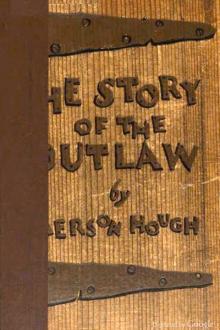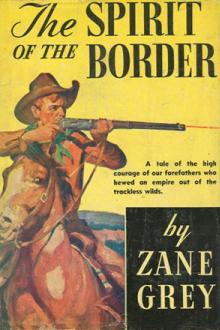The Lone Star Ranger: A Romance of the Border, Zane Grey [free ebook reader for iphone .txt] 📗

- Author: Zane Grey
Book online «The Lone Star Ranger: A Romance of the Border, Zane Grey [free ebook reader for iphone .txt] 📗». Author Zane Grey
On clear days—and rare indeed were cloudy days—with the subsiding of the wind at sunset a hush seemed to fall around the little hut. Far-distant dim-blue mountains stood gold-rimmed gradually to fade with the shading of light.
At this quiet hour a man climbed up out of the gorge and sat in the westward door of the hut. This lonely watcher of the west and listener to the silence was Duane. And this hut was the one where, three years before, Jennie had nursed him back to life.
The killing of a man named Sellers, and the combination of circumstances that had made the tragedy a memorable regret, had marked, if not a change, at least a cessation in Duane's activities. He had trailed Sellers to kill him for the supposed abducting of Jennie. He had trailed him long after he had learned Sellers traveled alone. Duane wanted absolute assurance of Jennie's death. Vague rumors, a few words here and there, unauthenticated stories, were all Duane had gathered in years to substantiate his belief—that Jennie died shortly after the beginning of her second captivity. But Duane did not know surely. Sellers might have told him. Duane expected, if not to force it from him at the end, to read it in his eyes. But the bullet went too unerringly; it locked his lips and fixed his eyes.
After that meeting Duane lay long at the ranchhouse of a friend, and when he recovered from the wound Sellers had given him he started with two horses and a pack for the lonely gorge on the Nueces. There he had been hidden for months, a prey to remorse, a dreamer, a victim of phantoms.
It took work for him to find subsistence in that rocky fastness. And work, action, helped to pass the hours. But he could not work all the time, even if he had found it to do. Then in his idle moments and at night his task was to live with the hell in his mind.
The sunset and the twilight hour made all the rest bearable. The little hut on the rim of the gorge seemed to hold Jennie's presence. It was not as if he felt her spirit. If it had been he would have been sure of her death. He hoped Jennie had not survived her second misfortune; and that intense hope had burned into belief, if not surety. Upon his return to that locality, on the occasion of his first visit to the hut, he had found things just as they had left them, and a poor, faded piece of ribbon Jennie had used to tie around her bright hair. No wandering outlaw or traveler had happened upon the lonely spot, which further endeared it to Duane.
A strange feature of this memory of Jennie was the freshness of it—the failure of years, toil, strife, death-dealing to dim it—to deaden the thought of what might have been. He had a marvelous gift of visualization. He could shut his eyes and see Jennie before him just as clearly as if she had stood there in the flesh. For hours he did that, dreaming, dreaming of life he had never tasted and now never would taste. He saw Jennie's slender, graceful figure, the old brown ragged dress in which he had seen her first at Bland's, her little feet in Mexican sandals, her fine hands coarsened by work, her round arms and swelling throat, and her pale, sad, beautiful face with its staring dark eyes. He remembered every look she had given him, every word she had spoken to him, every time she had touched him. He thought of her beauty and sweetness, of the few things which had come to mean to him that she must have loved him; and he trained himself to think of these in preference to her life at Bland's, the escape with him, and then her recapture, because such memories led to bitter, fruitless pain. He had to fight suffering because it was eating out his heart.
Sitting there, eyes wide open, he dreamed of the old homestead and his white-haired mother. He saw the old home life, sweetened and filled by dear new faces and added joys, go on before his eyes with him a part of it.
Then in the inevitable reaction, in the reflux of bitter reality, he would send out a voiceless cry no less poignant because it was silent: “Poor fool! No, I shall never see mother again—never go home—never have a home. I am Duane, the Lone Wolf! Oh, God! I wish it were over! These dreams torture me! What have I to do with a mother, a home, a wife? No bright-haired boy, no dark-eyed girl will ever love me. I am an outlaw, an outcast, dead to the good and decent world. I am alone—alone. Better be a callous brute or better dead! I shall go mad thinking! Man, what is left to you? A hiding-place like a wolf's—lonely silent days, lonely nights with phantoms! Or the trail and the road with their bloody tracks, and then the hard ride, the sleepless, hungry ride to some hole in rocks or brakes. What hellish thing drives me? Why can't I end it all? What is left? Only that damned unquenchable spirit of the gun-fighter to live—to hang on to miserable life—to have no fear of death, yet to cling like a leach—to die as gun-fighters seldom die, with boots off! Bain, you were first, and you're long avenged. I'd change with you. And Sellers, you were last, and you're avenged. And you others—you're avenged. Lie quiet in your graves and give me peace!”
But they did not lie quiet in their graves and give him peace.
A group of specters trooped out of the shadows of dusk and, gathering round him, escorted him to his bed.
When Duane had been riding the trails passion-bent to escape pursuers, or passion-bent in his search, the constant action and toil and exhaustion made him sleep. But when in hiding, as time passed, gradually he required less rest and sleep, and his mind became more active. Little by little his phantoms gained hold on him, and at length, but for the saving power of his dreams, they would have claimed him utterly.
How many times he had said to himself: “I am an intelligent man. I'm not crazy. I'm in full possession of my faculties. All this is fancy—imagination—conscience. I've no work, no duty, no ideal, no hope—and my mind is obsessed, thronged with images. And these images naturally are of the men with whom I have dealt. I can't forget them. They come back to me, hour after hour; and when my tortured mind grows weak, then maybe I'm not just right till the mood wears out and lets me sleep.”
So he reasoned as he lay down in his comfortable camp. The night was star-bright above the canyon-walls, darkly shadowing down between them. The insects hummed and chirped and thrummed a continuous thick song, low and monotonous. Slow-running water splashed softly over stones in the stream-bed. From far down the canyon came the mournful hoot of an owl. The moment he lay down, thereby giving up action for the day, all these things weighed upon him like a great heavy mantle of loneliness. In truth, they did not constitute loneliness.
And he could no more have dispelled thought than he could have reached out to touch a cold, bright star.





Comments (0)